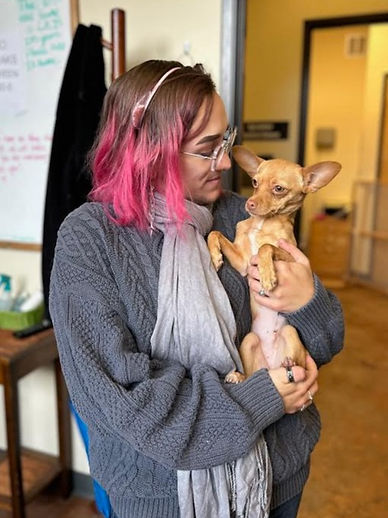Your Dog's Therapist
common questions
confidently choose the right trainer for you.
Hiring a trainer is a big decision. You and your dog both deserve a trainer who is transparent, compassionate, and educated.
This Q&A ought to give you an idea about my methods, practices, and qualifications.
what specific tools and methods do you use?
As a certified Family Dog Mediator (FDM), understanding the different dimensions of your dog's behavior is my first step to modifying it. By understanding your dog's Learning, Genetics, Environment, and Self (LEGS), we can come up with effective and humane behavior plans.
I am a force-free, R+ (positive reinforcement), and Least Intrusive Minimally Averse (LIMA) compliant trainer. I do not use aversive methods (including but not limited to prong/pinch collars, choke chains, shock collars, slip leads, alpha rolls, leash corrections, or other tools or methods that use pain, intimidation, or fear to modify behavior) and work actively with you and your dog to understand what they find reinforcing. For many dogs, a combination of food, toys, and opportunities for enrichment work as strong reinforcers. Understanding and using what your dog finds reinforcing is important as R+ training focuses on rewarding desirable behaviors to increase them. In a training session, the tools I use will generally include food/treats, toys, enrichment puzzles, a clicker, a 6- or 15-foot leash, and a collar or harness.
To modify behavior, I will use Behavior Adjustment Technique (BAT), antecedent arrangements, positive reinforcement, and/or pain/stress assessments, among other methods. We will spend a lot of time working together on establishing patterns and protocols that will increase your dog's confidence and resilience. If you have questions about my methods, please don't hesitate to contact me.
what qualifies you to work with my dog? what education have you received, and what certifications do you hold?
I am a certified Family Dog Mediator and a student in Grisha Stewart's Academy, where I aim to earn my CBATI-KA (Certified Behavior Adjustment Technique Instructor, Knowledge Assessed) title. I am a member of the International Association of Animal Behavior Consultants (IAABC) and intend to pursue their accreditation in dog training and certification in animal behavior consulting.
I am well-versed in positive reinforcement and force-free training methods, theory, and practice. I have taken courses through Family Dog Mediation, the Grisha Stewart Academy, Fear Free Pets, the Academy for Dog Trainers, and more. I've taken guidance from the writings of professionals including Turid Rugaas, Patricia McConnell, Karen Pryor, Karen Overall, Susan Friedman, and more. If you have additional questions about my qualifications and education, please don't hesitate to contact me.
are you compliant with the Joint Standards of Practice? do you abide by a code of ethics?
Yes and yes! The International Association of Animal Behavior Consultants (IAABC), the Association of Professional Dog Trainers (APDT), and the Certification Council for Professional Dog Trainers (CCPDT) have a statement on the Joint Standards of Practice here. As a member of the IAABC, I follow the Hierarchy of Behavior-Change Procedures in all my training and behavior modification.
I abide by the code of ethics set by the IAABC. Additionally, I strive to meet you and your dog where you are with transparency, compassion, and the highest standards of respectful and effective communication.
are there any cases you don't take? in what situations would you refer a dog to someone with more expertise or qualifications?
At this moment in time, I do not take cases involving dogs with a bite history if the bite has broken skin and the dog is over 7 months old. To ensure the safety of yourself and your dog, any dogs with bite histories like this will be referred to trainers with more experience. Additionally, I will not take cases that involve obsessive-compulsive behavior, dogs who require repeated obstruction surgeries, or dogs that have attacked and/or killed other pet animals.
As I gain more experience and education, the casework I will accept will change. For the time being, I will only accept cases that I feel confident I can successfully handle at my current level of certification, education, and experience.
how will I participate in my dog's training?
what instruction will I receive, and how?
You will be an active participant in your dog's training! By working together, we will identify not only the training styles that work for your dog, but the styles that work for you, too. Generally, you will receive relevant text and video resources, in-person demonstrations, and in-person, virtual, or over-the-phone coaching and emotional support.
how do I book? how much do your services cost?
Booking should be done by emailing yourdogstherapist@gmail.com.
If emailing, please include your first and last name, your contact information,
the services you are looking for, and relevant information about your dog.
Initial half hour consultations, which can be in-person, virtual, or over the phone, are always free.
Virtual consultation is $60 an hour and in-person training is $80 an hour.
I hope to hear from you soon!
